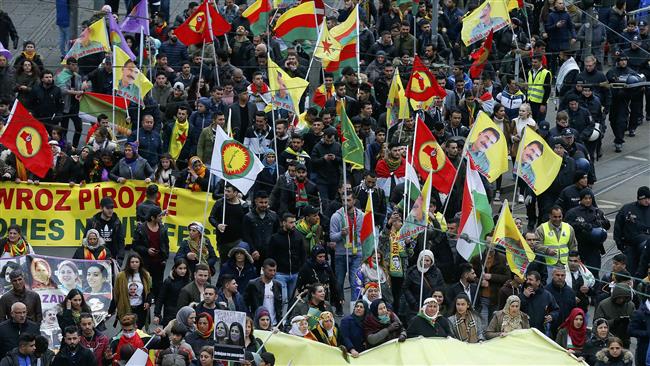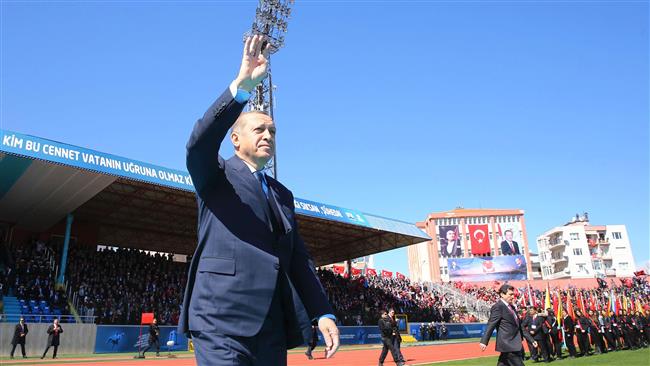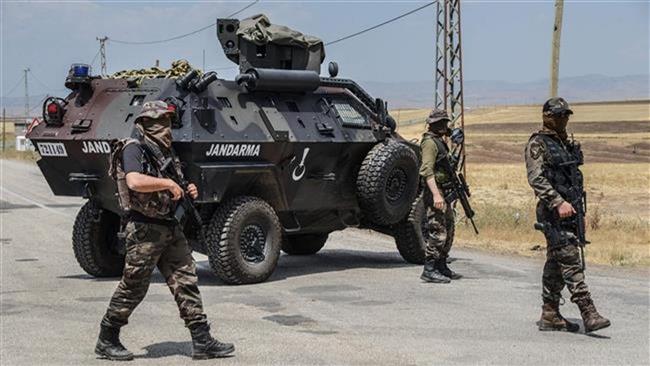Turkey summons German ambassador over Frankfurt PKK rally ‘scandal’
The Turkish Foreign Ministry has summoned the German ambassador to Ankara to voice its outrage at a Frankfurt rally in which tens of thousands of protesters brandished the insignia of the outlawed Kurdistan Workers' Party (PKK), lambasting Berlin for the “pro-PKK rally scandal.”
“Yesterday, the German ambassador was invited, was summoned, to the foreign ministry and this [rally] was condemned in the strongest way,” said Turkish President Recep Tayyip Erdogan’s spokesman Ibrahim Kalin on Sunday in an interview with the CNN Turk broadcaster.
He added that Germany had “put its name under another scandal” for giving permission to demonstrators to publicly use the insignia of the “separatist terror group” of PKK, which has battled the Turkish government for years.
The PKK, declared as a terrorist organization and banned, has been seeking an autonomous Kurdish region since 1984. A shaky ceasefire between the group and the Turkish government collapsed in July 2015 and attacks on Turkish security forces have soared ever since.
Over the past few months, Turkish ground and air forces have been carrying out operations against PKK positions in the country’s southeastern border region as well as in northern Iraq and neighboring Syria. More than 40,000 people have been killed during the three-decade conflict between Ankara and the militant group.
On Saturday, some 30,000 pro-Kurdish demonstrators, carrying pro-PKK signs and placards rallied in the German city of Frankfurt, demanding “democracy in Turkey” and urging a “No” vote in the upcoming referendum on expanding presidential powers.

The April 16 plebiscite is aimed at abolishing the office of the prime minister and giving more executive powers, including issuing decrees, declaring emergency rule, appointing ministers and state officials and dissolving the parliament, to the currently largely ceremonial position of the Turkish president. Critics, however, say the vote would give the Turkish president dictatorial powers.
Shortly after the rally in Frankfurt, the Turkish Foreign Ministry angrily slammed the demonstration as “unacceptable” and accused German authorities of “blatant hypocrisy” for allowing the protest despite barring Turkish ministers, earlier this month, from campaigning in the European country for a “Yes” vote.
The ban generated an unprecedented row between Ankara and Berlin, with Erdogan calling German Chancellor Angela Merkel a “terrorist supporter” for Berlin’s failure in responding to 4,500 dossiers sent by Ankara on terror suspects, including those linked to PKK militants and last year’s failed coup in Turkey. Erdogan on Sunday ratcheted up his fiery words against Merkel, accusing her of practicing “Nazi measures.”
Berlin further infuriated Ankara earlier on Sunday after Germany's BND foreign intelligence agency said that it was unconvinced by Turkish assertions that US-based cleric Fethullah Gulen had masterminded the failed putsch on July 15, 2016.
What the BND said contradicted Turkey’s stance as the country brands the movement as the Gulenist Terror Organization (FETO). Gulen has denied any involvement in the coup attempt and even condemned it.
Kalin accused Berlin of “whitewashing” the Gulen’s group, while Turkish Defense Minister Fikri Isik said that the controversial comments by the BND raised questions about whether Germany itself was involved in the coup attempt.
Turkey's foreign minister meets Syria's de facto leader in Damascus
'Next to impossible' to rescue patients from Gaza's Kamal Adwan Hospital: Director
VIDEO | Vietnam current prosperity
Report blames gasoil exports for shortage at Iranian power plants
VIDEO | Hind Rajab Foundation names Israeli war criminals vacationing after Gaza genocide
VIDEO | Australians rally for Gaza ahead of Christmas festivities
VIDEO | Attacks on Sana'a
Iran reports further drop in annual inflation rate in December














 This makes it easy to access the Press TV website
This makes it easy to access the Press TV website